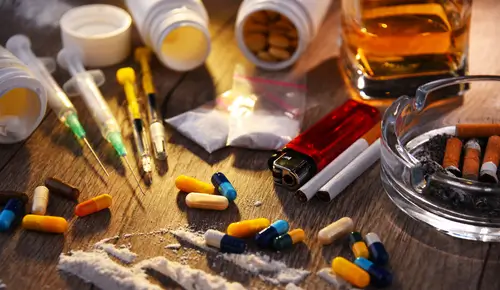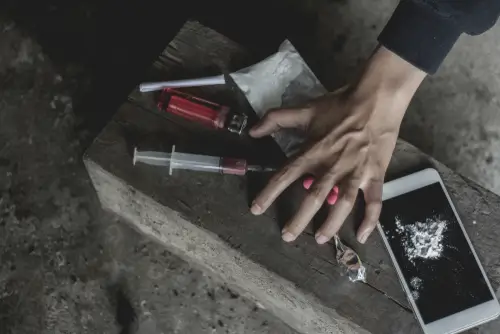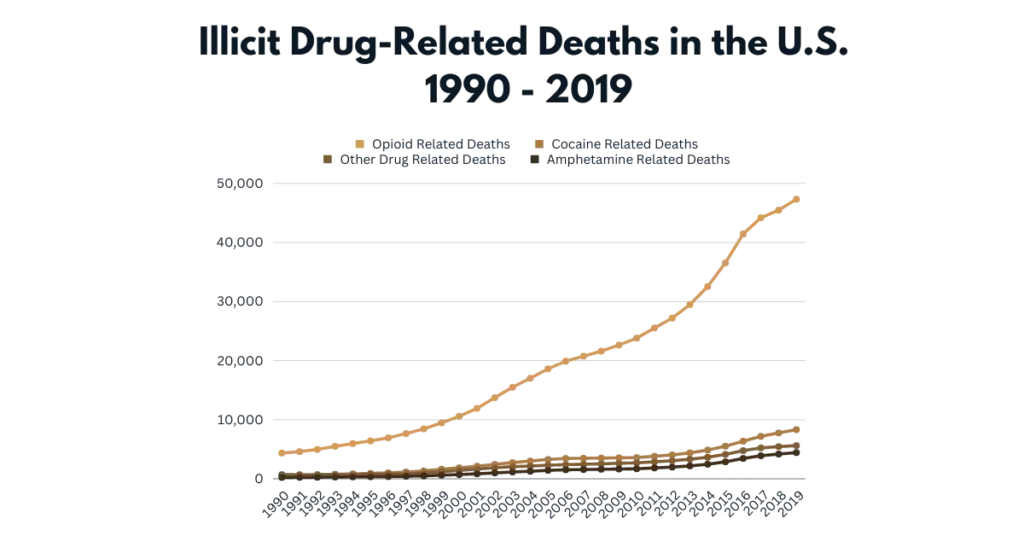An illicit drug is a substance that is not legally available for use, possession, or distribution. These substances are considered harmful and have been banned or restricted by the government in many countries. Many types of illicit drugs can cause substance use disorders, mental and physical health problems, and affect your personal life.
In the past 30 years, we have seen a dramatic increase in illicit drug use and drug overdoses throughout the United States and the world. Understanding the impact of illicit drugs and how dangerous they can be is more imperative than ever.
In this article, we will cover the many types of illicit drugs, their effects, how they have impacted various countries worldwide, and treatment options for those using illicit drugs.

What is an Illicit Drug?
As stated previously, an illicit drug is a substance that is not legally available. Many people confuse the term ‘illicit’ with the term ‘illegal.’ According to Merriam-Webster Dictionary, the term illicit can be used when describing any immoral or unlawful behavior that does not technically have to be illegal.
Now that we’ve clarified what the term illicit means, we can look at the different types of illicit drugs.
Types of Illicit Drugs
Illicit drugs are a diverse group of substances banned or restricted by governments worldwide due to their potential for harm. These drugs can be classified into different categories based on their effects on the body, including stimulants, depressants, hallucinogens, and opioids. Here are some of the types of illicit drugs:
- Stimulants: Stimulants are drugs that increase energy, alertness, and attention. Examples of illicit stimulant drugs include cocaine, crack cocaine, methamphetamine (also known as crystal meth), ecstasy (MDMA), and bath salts. Stimulant drugs can be highly addictive and cause various physical and mental health problems, including heart problems, stroke, anxiety, and psychosis.
- Depressants: Depressants are drugs that slow down the central nervous system, causing relaxation and sedation. Examples of illicit depressant drugs include barbiturates, benzodiazepines (such as Xanax and Valium), and GHB (gamma-hydroxybutyrate). These drugs can be highly addictive and cause various physical and mental health problems, including respiratory issues, memory loss, and coma.
- Hallucinogens: Hallucinogens are drugs that alter perception, thought, and mood. Examples of illicit hallucinogenic drugs include LSD (lysergic acid diethylamide), psilocybin (found in “magic mushrooms”), and PCP (phencyclidine). Hallucinogenic drugs can cause profound changes in consciousness and lead to dangerous behavior, such as self-injury and suicide.
- Opioids: Opioids are drugs that act on the nervous system to relieve pain and produce feelings of euphoria. Examples of illicit opioids include heroin, fentanyl, and oxycodone. Opioid drugs are highly addictive and can cause respiratory depression, overdose, and death.
- Other Illicit Drugs: Other illicit drugs include synthetic cannabinoids (such as Spice and K2), which are chemically synthesized compounds that mimic the effects of marijuana or cannabis. These drugs can cause various health problems, including psychosis, seizures, and kidney damage. Additionally, prescription drugs used non-medically, such as Adderall and Oxycontin, are considered illicit when used without a prescription.
The Effects of Illicit Drug Use
The effects of illicit drug use can vary widely depending on the specific drug used, the method of administration, the amount consumed, and the individual’s physical and mental health status. However, illicit drug use can generally have a range of negative physical, mental, and social consequences.
Illicit Drug Withdrawal Symptoms
Drug abuse can cause many physical and mental health problems when used. There are also many different withdrawal symptoms that an individual can experience depending on the type of substance they use, how long they use it, and the individual’s body composition. Here are some of the withdrawal symptoms someone may experience:
- Headaches
- Nausea or vomiting
- Dizziness
- Sweating or chills
- Anxiety or panic attacks
- Fatigue
- Hallucinations or delusions
- Frequent mood swings
- In extreme cases, coma or death

The Impact of Illicit Drugs Around the World
Illicit drugs significantly impact individuals and societies worldwide, affecting physical and mental health, economic productivity, and overall social welfare. The impact of illicit drugs is complex and multifaceted, with the effects varying depending on the drug, the location, and the population.
One of the most significant impacts of illicit drugs worldwide is the burden on healthcare systems. The use of illicit drugs can lead to a range of health problems, including infectious diseases like HIV/AIDS and hepatitis, mental health disorders like depression and anxiety, and physical health problems like heart disease, lung cancer, and death. The cost of treating these health problems can be high, and the burden is often held by public healthcare systems, putting a strain on resources.
From 1990 to 2019, we can see a significant increase in illicit drug-related related deaths throughout the world. In 1990, there were 56,144 recorded illicit drug-related deaths, and by 2019, that number had jumped to 128,082, a 128.13% percent increase. Of those deaths, 36,821 were opioid-related in 1990, while there were 88,353 in 2019. It’s important to note that these numbers may be missing information from some countries. However, this data shows just how prevalent drug control and the impact of illicit substances have become in recent years.
Illicit Drug Use in the United States
Illicit drug use is a significant problem in the United States, with far-reaching consequences for individuals, families, and communities. The United States is one of the world’s largest consumers of illicit drugs, with an estimated 21.2 million people over the age of 12 reporting past-month use of illicit drugs in 2020.
Despite efforts to combat illicit drug use in the United States, including prevention, treatment, and harm reduction strategies, the problem persists. The opioid epidemic began in the 1990s and has had a particularly devastating impact, with millions of people affected by addiction, overdose, and death. In the United States in 1990, there were 5,865 recorded illicit drug-related deaths, and by 2019, that number had jumped to 65,717, a 1,020.49% percent increase. Of those deaths, 4,352 were opioid-related in 1990 and 47,337 in 2019.
Illicit drug use is a significant problem in the United States, with far-reaching consequences for individuals, families, and communities. Addressing the problem requires a comprehensive approach that includes prevention, treatment, and harm reduction strategies. Reducing the impact of illicit drugs in the United States will require ongoing efforts and collaboration across multiple sectors, including healthcare, law enforcement, public policy, and drug policy.

Treatment for Illicit Drug Use
Substance abuse is a complicated and life-threatening disease to deal with. Luckily, there are many drug treatment centers to help individuals combat their addiction in a multitude of ways. Effective treatment for drug addiction typically involves a combination of behavioral therapy, medication, and support services.
Behavioral Therapy
Behavioral therapy is a crucial component of drug addiction treatment. Therapies such as cognitive-behavioral therapy (CBT) and motivational interviewing (MI) can help individuals understand and change the thoughts and behaviors contributing to drug use. These therapies can also help individuals develop coping skills and strategies to manage triggers and prevent relapse.
Medication-Assisted Treatment
Medication-assisted treatment (MAT) is another essential component of drug addiction treatment. Medications such as methadone, buprenorphine, and naltrexone can help individuals manage withdrawal symptoms and cravings associated with opioid addiction.
Support Services
Support services such as mutual-help groups like Narcotics Anonymous (NA) and Alcoholics Anonymous (AA) can also be helpful in the recovery process. These groups provide a supportive and non-judgmental environment for individuals in recovery to share their experiences, receive support from others, and develop healthy coping skills.
Illicit Drug Addiction Treatment at Launch Centers
At Launch Centers, we understand that young adults with substance abuse issues often struggle to envision a bright and fulfilling future. That’s why we offer comprehensive treatment programs to address their unique needs and support them in building a successful life. Our addiction treatment center is dedicated to providing the appropriate resources to those struggling with addiction.
If you or a loved one is struggling with substance, mental health issues, or illicit drug addiction, please contact us today to learn more about how we can help you. The path to recovery is difficult, but you do not have to do it alone.





